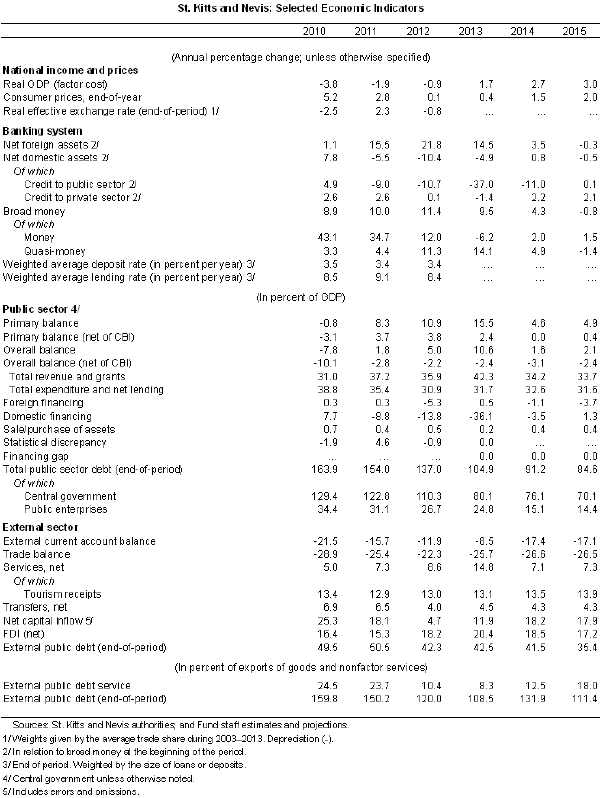Press Release: IMF Executive Board Concludes 2014 Article IV Consultation with St. Kitts and Nevis
March 27, 2014
International Monetary Fund
Washington, D.C. 20431 USA
Press Release No. 14/138March 27, 2014
On March 19, the Executive Board of the International Monetary Fund (IMF) concluded the 2014 Article IV consultation1 s with St. Kitts and Nevis. On the same day, the Board also completed the seventh and eighth review under a program supported by a 36-month Stand-by Arrangement (SBA), see: Press Release 14/117.
St. Kitts and Nevis is recovering from a four-year economic recession, occasioned by the international financial crisis, the need to restore fiscal sustainability and restructure public debt. For 2013, real GDP is estimated to have grown by 1.7 percent, based on a modest recovery in tourism, and a strong pickup in construction related to the Citizenship by Investment (CBI) program and other tourism-related projects. Inflation has declined following the introduction of the VAT at end-2010 and the hike in electricity tariffs in early 2011 and remains low and stable. Robust CBI and rising tourism receipts are projected to have narrowed the current account deficit from 21.4 percent of GDP in 2010 to 8.5 percent of GDP in 2013, which have together with increased capital inflows, increased international reserves. The commercial banks remain resilient despite the recession and the impact of the debt restructuring.
The economy is expected to grow by 2.7 percent in 2014 and continue to strengthen over the medium-term towards its potential growth rate of 3–3.5 percent. Tourism should continue its recovery, supported by increased airlift capacity and new room capacity, while CBI inflows and other projects are expected to continue to fuel construction.
The fiscal consolidation has progressed considerably, reflecting both concerted policy efforts and continued strong CBI revenues which have mostly been saved. The overall balance improved from a deficit of 7.8 percent of GDP in 2010 to an estimated surplus of 10.6 percent of GDP in 2013.Tax revenues stagnated in percent of GDP after an initial boost from introducing the VAT, while CBI revenues grew from 2.3 percent of GDP in 2010 to a projected 13 percent of GDP in 2013. Current expenditures were compressed through a hiring and wage freeze since 2010, while the corporatization of the Electricity Company, and interest reductions following the debt restructuring provided for further budgetary savings. The stronger fiscal positions enabled the authorities to grant the thirteenth month wage payment in 2013 and increase capital spending. Fiscal consolidation and debt restructuring reduced the debt-to-GDP ratio from 164 percent in 2010 to around 105 percent in 2013, but the debt remains high and vulnerable to exogenous shocks.
Executive Board Assessment2
Executive Directors agreed with the thrust of the staff appraisal. They commended the authorities’ successful implementation of their home-grown Fund-supported program. Growth has resumed after four years of contraction; a significant fiscal adjustment has been achieved; and progress has been made in debt restructuring. Directors underscored the importance of continued efforts to strengthen the fiscal framework, reduce debt further, and implement growth-enhancing reforms. They welcomed the authorities’ intention to treat the arrangement as precautionary for the remainder of the program in view of the improved external position.
Directors welcomed the authorities’ commitment to continue fiscal consolidation to secure medium-term fiscal sustainability. They supported further efforts to broaden the tax base, strengthen tax administration, contain current outlays, and enhance public financial management. They recommended greater restraint in future wage increases and public sector hiring, and proceeding with civil service reform. Directors welcomed plans to save the bulk of Citizenship by Investment receipts to build buffers and consider setting up a stabilization fund to support public debt reduction and productive infrastructure projects. They called for vigilance to prevent a recurrence of external arrears.
Directors underscored the importance of sustaining the pace of fiscal structural reforms. They encouraged the authorities to move swiftly to implement regulations for the Civil Service Act and the Procurement and Contract Act, develop proxy means testing for social safety net programs, and submit the Customs Law to parliament. These measures are needed for a more efficient and productive public sector that can support a dynamic private sector. Directors looked forward to the finalization of debt restructuring negotiations with remaining bilateral creditors.
Directors noted that the banking sector remains resilient and well capitalized. They commended the progress in strengthening the supervisory framework for credit unions and the increase in their capitalization, but noted the need to further consolidate their balance sheets. Directors also stressed the importance of facilitating banks’ plans to reduce nonperforming loans, and of launching land sales to buttress banks’ liquidity. Strong oversight of the financial sector, in close collaboration with the Eastern Caribbean Central Bank, should continue.
Directors agreed that the priority going forward is to enhance growth. They commended efforts to boost the tourism sector and its contribution to GDP, plans to support investment in alternative energy to reduce energy costs, and measures to strengthen the business and investment climate. Vigilance to ensure that investments are yielding the expected results and readiness to review the strategy, as needed, will be important.

|
1 Under Article IV of the IMF's Articles of Agreement, the IMF holds bilateral discussions with members, usually every year. A staff team visits the country, collects economic and financial information, and discusses with officials the country's economic developments and policies. On return to headquarters, the staff prepares a report, which forms the basis for discussion by the Executive Board. 2 At the conclusion of the discussion, the Managing Director, as Chairman of the Board, summarizes the views of Executive Directors, and this summary is transmitted to the country's authorities. An explanation of any qualifiers used in summings up can be found here: http://www.imf.org/external/np/sec/misc/qualifiers.htm. |
IMF COMMUNICATIONS DEPARTMENT |
| Media Relations |
|---|
| E-mail: media@imf.org |
| Phone: 202-623-7100 |


